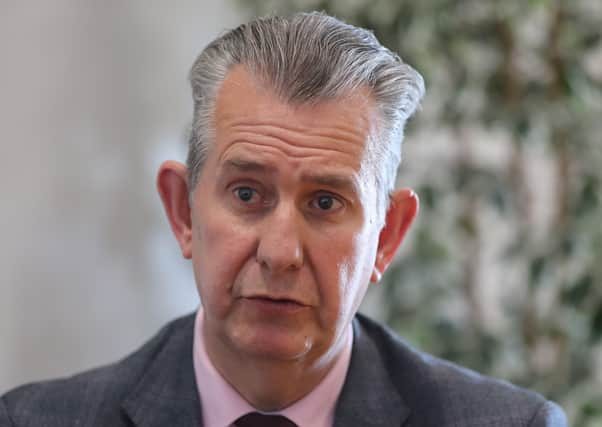Opposition grows to tariff free trade deal


There are fears an FTA with Australia that allowed tariff and quota free access for sensitive agricultural products would be damaging Northern Ireland’s beef and sheep trade.
Minister Poots said: “The prospect of such a deal presents a high level of risk to Northern Ireland and UK farmers. Therefore I believe that the UK should maintain tariff protection at present levels for all agricultural products where the UK has a significant production interest.
Advertisement
Advertisement
“Australia has a number of distinct advantages over Northern Ireland, and the rest of the UK, in terms of the land available for farming, climate and lower standards that allows it’s farmers to be able to produce at a considerably lower cost, particularly in the beef and sheep sectors. Consequently there is a lot of potential for Australian beef and sheep exports to the UK to expand substantially over time if tariffs are eliminated. Australian beef and sheep products have the potential to undercut UK producers and to reduce Northern Ireland’s market share in GB which is our most important market for these products.”
This is in line with the UKG’s impact assessment of the UK Australia FTA which concluded that full tariff liberalisation would result in an increase of imports from Australia of 83% and a fall in UK agricultural output of more than 0.5% and notes that “it is expected that the increase in imports would, in part, comprise sheep meat (including lamb) and bovine meat.”
The Minister continued: “The assessment also notes that Northern Ireland is predicted to experience a negative impact in output terms overall from tariff liberalisation with Australia due to our specialisation in agri-food.
“I have a multitude of other concerns relating to this proposal:
Advertisement
Advertisement
- A zero tariff, zero quota deal with Australia would create an expectation of similar deals with other countries;
- Australia permits a number of practices which give rise to real animal welfare concerns and also allows the use of growth hormones to increase the weight of cattle which is not permitted in the UK. - It is imperative that Australian exports that do not meet UK farming standards are not allowed to access the UK market;
- Future actions by the UK to address climate change, which will have very significant challenges for agriculture, could create a further disadvantage as there is no guarantee that Australia will be taking the same measures.
“For these reasons tariff protection must be maintained for beef and sheep products. While beef and sheep give rise to the greatest concerns, protection must be maintained for all sensitive agri-food products where NI has a significant production interest, including dairy, pigs and poultry.”
Advertisement
Advertisement
Meanwhile, Sinn Féin MLA Declan McAleer has expressed serious concern at the impact of a proposed trade deal between Australia and the UK on local farmers and agrifood producers.
Speaking after Thursday’s AERA committee where the issue was raised, Mr McAleer said: “The prospect of a tariff free trade deal between Britain and Australia poses a serious threat to farmers and agrifood businesses here on the island of Ireland. The issue was discussed at the Agriculture committee earlier today where we agreed to seek an urgent update from DAERA and make representation to DEFRA in Britain.
“At 58% self-sufficiency, Britain is a huge importer of food. Approximately 50% of all the food produced in the north is exported to the British market in an industry which is worth over £3 billion every year to our local economy, underpinning 100,000 jobs.
“The prospect of a tariff free, Australian-UK trade deal would displace our share of the British market because our farmers simply could not compete with such a huge food producing continent. Worryingly, this could also set the precedent for future trade deals with other major food producing nations such as the USA and the Mercosur countries of South America.
Advertisement
Advertisement
“Sadly, none of this is a surprise and is in fact the outworking of a long standing Tory cheap food policy, made possible by a Brexit decision that the people of Ireland did not support but who will pay a heavy price for.”